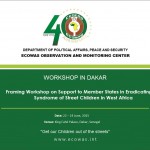|
 (Click on the photo to follow the event) (Click on the photo to follow the event)
The ECOWAS Commission’s Early Warning Directorate will organise a workshop in Dakar, from the 22nd to the 24th of June, 2015, to launch the Regional Support Programme for the organisation’s Member States to put an end to Street Children Syndrome.
At the end of the workshop, the first in a series of activities envisaged in the biannual plan of action (2015-2017) to eliminate the street children syndrome in the ECOWAS region, a framework on this societal ill as well as a control measure based on the appropriate implementation of laws and strategies, would be established.
The actual launching ceremony will be chaired by the Senegalese Prime Minister, Mr Mohamed Dionne who will deliver an opening address after speeches by top ECOWAS management staff, namely: the Commissioner for Political Affairs, Peace and Security, the Commissioner for Gender and Social Affairs, the President of the Community Court of Justice, and the Speaker of the ECOWAS Parliament.
Much ink and erudition haves been expended on the expression «street children», but experts and policy makers have adopted UNICEF’s definition of the term, which qualifies them as boys and girls under 18 without adequate protection or supervision, and for whom «the street» (including abandoned lots and wastelands) have afforded normal haunts and places of abode and/or source of livelihood.
As an all-encompassing term, it describes children in various circumstances who exhibit a wide range of characteristics and can be found in several big cities of the world, and now becoming a more recurrent phenomenon in some highly populated urban centres in developing countries or regions with unstable economies on the African continent.
According to UNICEF, the capital of Senegal, Dakar, alone accounts for over 50,000 street urchins, and over 100,000 in other towns in the country. These boys aged between six and twelve are put under the tutelage of Islamic teachers called “marabouts” to learn the Koran.
Several reasons have been adduced for this phenomenon, which are mainly the result of domestic, economic or social crises, particularly poverty, breakdown of homes and/or families, political upheavals, sexual abuse, physical or emotional violence, domestic violence, mental health problems, and drug abuse.
Cultural and religious reasons also play a role in the prevalence of street children. Some children in Northern Nigeria, commonly referred to as “Almajiris”, are forced to abandon their homes in the quest for seeking the teachings of the Koran under the tutelage of a “mallam”.
During their apprenticeship, the children are sent out to the streets to fend for themselves by begging for alms. Often times, they are also compelled to hand over some or the entire collection to the « mallam », and are punished severely if they fail to do so.
One of the main ECOWAS priorities, in keeping with the provisions of its Vision 2020, is to fight this scourge to enable:
«the ECOWAS region and its Member States to enjoy a secure and peaceful environment through the promotion and creation of the necessary conditions for the security of the State and people, for the attainment of a sustainable socioeconomic development, and the improvement of the living conditions of the people ». Similarly, one of the fundamental principles of the International Convention on the Rights of the Child prescribes that each child must be shielded from all types of abuse and indecent and degrading treatment.
Article 27 of the United Nations Convention on the Rights of the Child stipulates that
«every child has a right to a standard of living adequate for his physical, mental, spiritual, moral and social upliftment».
Given the fact that parents have the primary responsibility of securing the conditions of living necessary for the child’s upliftment, States party to the Convention are expected to provide appropriate measures to assist parents to implement that right.
It is for that reason that the strategic objective of the regional approach to the elimination of the street children syndrome is rooted in the implementation of the ECOWAS Vision 2020 and the United Nations Convention on the rights of the child.
In the light of the negative impact of this phenomenon on the socio-economic development of the West African region, the project aims at developing a multi-dimensional approach erecting strong systems and support structures to stop this societal ill in the ECOWAS region and create an environment that will safeguard the protection of vulnerable children.
Apart from ECOWAS, its institutions and Member States, several other partners are involved in the programme including UNICEF, Children of the Street, International Crisis Group, Human Rights Watch, Amnesty International, WASCOF, WANEP, OSIWA, UNOWA, Raddho, USAID and GIZ.
|




